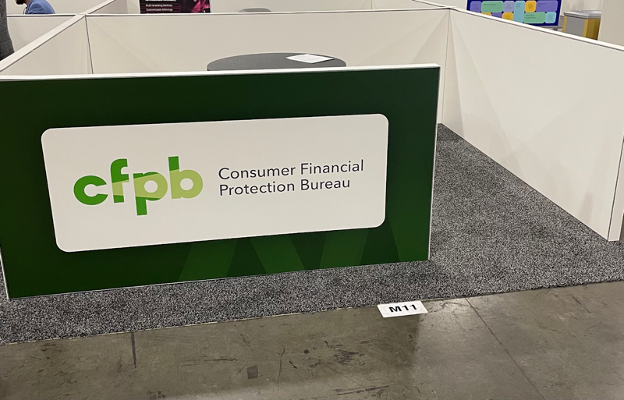I’m going to recap Fintech Meetup 2025 by answering a series of questions that I just made up.
Wait, isn’t it cheating to do a Q&A when you’re the one coming up with the questions?
Yes, it absolutely is. But it’s my newsletter, and this is the gimmick I want to use, so we’re doing it.
Is it true that the CFPB had a booth at the show but no one to staff it?
Yep, this is also true. I took a picture:

The humor in this picture is obvious (it would have been even more obvious if I’d managed to get a picture of the fintech founder I saw sitting in the booth with their feet propped up on the table).
The sadness of the situation would really only be apparent to you if you had been there in person — a whole bunch of bank executives and fintech founders walking around, discussing innovative and (potentially) risky ideas, while the primary regulator responsible for protecting consumers is absent.
Not the way it’s supposed to work!
Indeed, even the banks are getting upset that there’s no one answering the phones over at CFPB headquarters right now.
So, the mood was kinda grim, huh?
Actually no. For the most part, everyone I talked to was fairly upbeat and optimistic about the short and medium-term future (this a typical, and wonderful, attitude in fintech).
The exceptions were the folks who are directly tied, in some way, to capital allocation.
These people are nervous.
The economic uncertainty radiating out of Washington, D.C. right now is causing heartburn for lenders (who are much less able to forecast demand from consumers and businesses), VCs (who are worried about raising their next funds), and private credit funds (who have been shortening the terms of the credit facilities that they are providing to non-bank lenders and corporations).
I’ve read lots of good theories on why the Trump Administration is seemingly trying to slow down the U.S. economy (Kyla Scanlon is my favorite writer on this and many other topics), but doing so in such a chaotic manner is creating nearly unprecedented levels of uncertainty.
What was your favorite quote from the conference?
This distinction goes to Ximena Aleman Silva, CEO of Prometeo.
Xime was one of the panelists in the session that I was moderating — Unleashing Open Finance’s Transformative Potential for Banking and Payments — and during the panel, she dropped this banger:
Brazil is Disneyland for fintech.
She was referring to the success that Brazil’s Central Bank has had in modernizing the country’s financial infrastructure and regulation in areas like real-time payments and open banking, and I really liked that she used Disneyland as the analogy.
Disneyland is fun and profitable, but the reason that’s true (and has remained true for so long) is that there is a centralized organizing force behind the scenes, providing a very well-thought-out and prescriptive set of rules and processes that everyone in the park agrees to follow.
The U.S. (which I would analogize to Universal Studios) could learn a thing or two.
What was the hottest trend at Fintech Meetup?
The one I heard about the most was agentic commerce.
The idea is straightforward and obviously valuable — empowering AI agents to conduct commerce transactions on behalf of consumers and businesses.
The execution of this idea is where things get tricky, and to illustrate why, let’s compare two different models of human-powered agentic commerce.
On the one hand, you have a kick-ass executive assistant with 25 years of experience working for some of the most demanding executives in corporate America. This is the person you give your corporate and personal cards to and just say, “Make my life easier.” And then that’s what happens, and you can’t ever imagine living without them.
On the other hand, you have a 16-year-old intern who has never had a job before. They are very eager to assist you and very open to feedback, but they also make mistakes constantly and you have to monitor them 100% of the time and double check all of their work to make sure stuff doesn’t get screwed up.
Set the reality of how well AI agents work today aside. The perception of how well they work and how reliable they are falls more on the intern side of the continuum.
Given that, the agentic commerce systems I saw at the conference were heavily locked down. They were constantly monitored, audited, and the scope of what the agents were allowed to do autonomously was very narrow.
This makes sense for the current moment, but eventually, we will need to build (and trust) an executive assistant.
What ideas did you personally become obsessed with after spending four days talking/debating/brainstorming with your fellow fintech nerds?
There are quite a few rattling around in my brain right now. Here are the loudest:
- Overdraft protection is dumb. I don’t mean that in the sense that it’s bad (although it often is). I mean that it’s unintelligent. One of the biggest problems with overdraft protection is that it doesn’t have any context on the specific transactions that it is protecting, which is really quite strange when you think about it. How can you protect something when you don’t know what it is? Overdraft protection should be contextually aware and able to work differently depending on the nature of the individual transaction that is triggering it.
- BaaS banks might end up missing the next big thing. BaaS banks are, collectively, holding themselves to a much higher standard, in terms of the fintech programs they are willing to work with, today than they were two years ago. This is good, but the challenge is maintaining a high standard while ensuring you don’t miss out on big, non-obvious opportunities. If you judge early-stage programs solely based on how much money they’ve raised, the VCs they’ve raised from, and the founders’ prior startup experiences, you’ll be efficient at identifying low-risk programs. However, you will likely miss out on some big opportunities, not because they were bad risks but because they were unknown risks. This is an emerging issue in BaaS that we need to start solving for.
- Fintech product franchises are going to be a thing. After this week, I am even more convinced that fintech franchising — the distribution of fully-baked fintech products through community banks and credit unions — will be a big trend in the second half of the 2020s. Despite all the doom and gloom about industry consolidation, community banks and credit unions aren’t going anywhere. They are too important, to both the market and to policymakers’ conception of what the market should look like. However, in order for them to thrive, they will need to stop assuming that they have a default right to win in their markets and invest in better, more competitive products. Fintech franchising is one model for how to do that. Bonus prediction — community development financial institutions (CDFIs) and minority depository institutions (MDIs) will be early adopters of franchised fintech products.
- Cash flow underwriting should create more accountability for lenders. When you get declined for a loan, you are entitled to an explanation. The way these explanations (referred to in the industry as adverse action notices) work today, the answer you get back from the lender is likely to be vague and unsatisfying. If you’re sufficiently unhappy with that answer, you can check your credit reports and look for any inaccuracies that might have contributed to the declination. In cash flow underwriting, it’s very unlikely that there will be an inaccuracy in the underlying data (which is sourced directly from your bank account), which means that the error (if you feel that one was made) is likely the result of something that the lender did while cleaning, categorizing, or analyzing that data. As we move into the world of cash flow underwriting, I hope we can create more direct mechanisms to hold lenders accountable for the mistakes they might make during those processes.
- Who is building agentic AI for identity theft resolution? Someone close to me just had their identity stolen, and (predictably) it has been a nightmare for him to investigate and resolve. There are tons of different organizations that he needs to interact with (credit bureaus, financial institutions, law enforcement agencies, etc.), and each of them requires him to wade through onerous digital (and sometimes paper-based) processes to fix the problem. Does this workflow not seem tailor-made for agentic AI? Who is building this?


